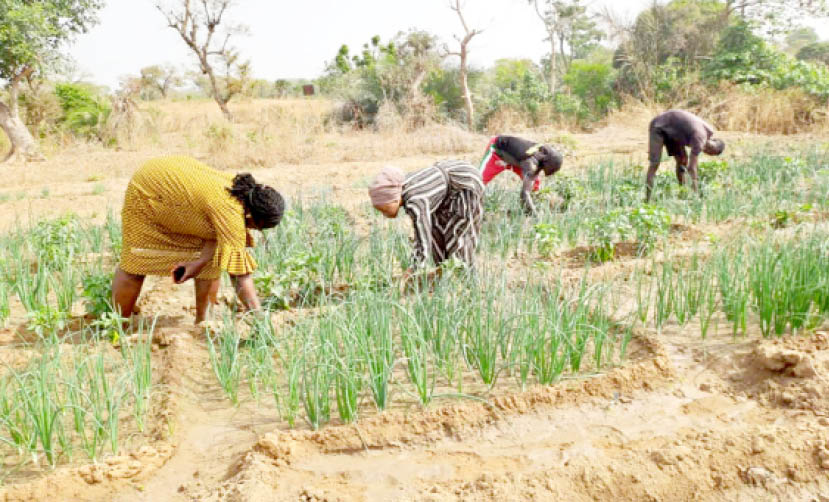The NNIL Commercial Company Ltd, previously called Northern Nigerian Investment Limited (NNIL), was established in 1956 as a development finance institution, primarily to stimulate the industrial and economic development of the then Northern Region by the Commonwealth Development Corporation (CDC) and the then Northern Nigeria Government to promote investment activities in the region.
In 1978, CDC’s interest was taken over by New Nigeria Development Company Ltd (NNDC), thus converting the NNIL into a wholly owned subsidiary. Since then, the company has been engaged in the importation of synthetic fertiliser and other agricultural implements to state governments in the country, as well as other trading and investment activities.
Recently, because of the negative effects of chemical fertiliser, herbicides and other chemical inputs, the subsidiary (NNIL) entered into partnership with CONTEC Global Agro LTD, a firm into the manufacturing of bio-safe, 100 per cent organic agricultural product, in its bid to change the fortunes of farmers and importers of agricultural products.
According to the management of the company, the move was prompted by the inability of Nigerians to export agricultural products outside the country due to the high chemical residues found in most of the products being exported by Nigerian farmers.

Head of the Production Department, NNIL, Malam Shuaibu Dahiru, who spoke on behalf of the company, said that since the company started the sales and supply of the organic fertilser and its associate products to farmers, especially in these six states, namely, Plateau, Kaduna, Zamfara, Borno, Nassarawa, Adamawa and Benue, farmers have been giving testimonies on how the product is yielding positive results.
“We discovered that the content of the bio-safe fertiliser is produced and sourced within Nigeria, and having paid a visit to their office, we were convinced that they will meet our needs and address the reasons we are moving away from synthetic fertiliser,” he said.
He noted that they had interactions with farmers within these areas to intimate them on the products, saying, “We started to market the products by educating the farmers on the importance of using the bio-safe organic fertiliser as it relates to the health of their body, soils, crops and the overall farm budget.”
He expressed optimism that from the awareness and the corresponding results, farmers are becoming more comfortable with using the products.
He added, “The farmers that were patient enough to follow the instructions given on how to apply each product got very good results from their farms, and many of them who used the product were not caught up in the disease that ravaged many ginger farmers in Kaduna.
According to him, because it is an organic fertiliser, it does not disappear from the soil as fast as the synthetic fertiliser; it remains beneficial to the crop throughout its life cycle. Our repeat sales experience had been very impressive as a lot of the farmers have been coming back to buy more.
“The product has been certified, nationally and internationally by the regulatory bodies, including ECOCERT and the United States Department of Agriculture Organic Certificate (USDA Organic); and it has undergone several trials in the laboratory and on the field; that is why we are very comfortable marketing it so that we will be able to produce crops that can be sold in the international market.
“From our interaction with the farmers, those that have attempted exporting, commodities like ginger and yam, have had their produce rejected in markets like the European market because it failed to meet their required standards due to chemical residues discovered in the products. This comes from the heavy use of pesticides and other inputs above permissible limits,” he also said.
They (farmers), however, expressed optimism that with the use of Contec Global Agro Ltd bio-safe products, Nigerian farmers would be able to meet the requirements of markets like the European market, improve their economic wellbeing and boost the export market. Already, an onion farmer in Kafanchan, Nojied Achi, has successfully exported onions from Kafanchan; her ginger passed the UK crop test, using the organic fertiliser.
Daniel Emmanuel, a soil scientist at the NNIL, said farmers preferred the synthetic fertiliser because its results were spontaneous; farmers were celebrating, not knowing the grave impact it was making on the soil.
“Fertiliser is expected to serve as a booster to plants; the soil naturally contains some beneficial elements the plants take in to produce what we eat. But over time, using the soil frequently, there will be depletion of the nutrients in the soil, so the idea of fertiliser is to help the soil replenish what it has lost. Using synthetic fertiliser further depletes the soil.
“Farmers later realised that with continuous use of the synthetic fertiliser while the quantity of the fertiliser increased, the crop yield steadily declined. More fertiliser use promoted rapid degradation of the soil, increasing health concerns from chemical residues and heavy metals in the plant and the environment,” he added.
Highlighting the benefits of the organic fertiliser, he said it served like food to the soil and the crops, having been starved for a long time. They have been able to harness the nitrogen (N), phosphorus (P) and potassium (K) together to have what we call the organic, SRI Gold NPK fertiliser (granules). They have also been able to add a bio content, which comprises of three essential bacteria which helps the plant absorb nitrogen from the atmosphere so that even without urea, the plant will produce maximally.
“What synthetic products do is that they make the soil acidic, and when the soil is more acidic, it can play host to various pathogens, but what we are giving as organic fertiliser is balanced; the Ph is between 6 and 7.5. This will heal the soil by reducing its acidity and improve its ability to fight diseases because of the presence of more nutrients. Our organic products do more preventive than curative.
He advised farmers to embrace the use of the bio-safe organic fertiliser and the associated products on their farms to experience increased yield and also turn out healthy crops for consumption.
Habibu Shehu, a representative of CONTEC Global Agro Ltd, said the bio-safe organic fertiliser and associate products are produced from plant and animal sources and are in accordance with Nigeria regulatory standards and certified by the National Agency for Drug Administration and Control (NAFDAC).
He maintained that the company offered technical support for farmers, farmers cooperative, dealers and distributors.
He noted that the company had plans to expand the product line and market demand, but the major challenge is that the product is still at the awareness and acceptance stage by majority of farmers and dealers. He, however, added, “But we are doing our best to ensure that in the shortest possible time, every farmer in Nigeria becomes committed to sustainable agricultural practices, enhanced by the use of our bio-safe organic products.”
A farmer from Hunkuyi, Abbati Abubakar, who has been farming for over 30 years, said he was very impressed by the outcome of his farm after using the organic products, especially on vegetables.
“My onions had problem at the beginning and I thought I was going to lose everything, but with the help of the organic products I now use on my farm, the disease was treated and my farm was back to normal. Since then, people started to troop to my farm to collect the miracle product I used to treat the disease.
“I have also used the product on cabbage, carrot, tomatoes and other vegetables and they all came out well. I have refused to collect the products in a large quantity because I fear that people would collect it on credit and spoil my relationship with the dealers.”
He called on farmers to embrace the new products if they want to grow better crop and experience increasing yield, year in year out, especially this year that the rains are not so frequent as the product has properties to help the plants.
Also, Nojied Achi, the founder of AchiGreens Farms Ltd, who recently got approval to sell her ginger in Europe after her products passed the lab tests, said she did not regret using the organic fertiliser and other products on her farm.
Achi, who belongs to a women famers cooperative known as the Yeyock Women Ginger Farmers, which engages in ginger farming, said they had been growing ginger organically for a long time, but they do not get the best results due to lack of certification.
“Last year, with everything that happened to ginger, our farms were not affected because we have been engaged in the organic practice and our cooperative of 2,500 women in the ginger catchment area is into partnership with various international agro organisations to ensure best practices,” she said.
She said she had been using the products since 2021 and her yield kept increasing every year noting, adding, “Since we used it the first time and people saw how our plants did well, they came asking for the product. More and more people have started using the fertiliser.”
She noted that because ginger is a nine-month crop, the women have also gone into other crops like onions, tomato and pepper to sell and keep themselves out of hunger before the ginger is ready for harvest.
She disclosed that her onions had reached Saudi Arabia, the United Arab Emirates, and very soon, they will start exporting other products.

 Join Daily Trust WhatsApp Community For Quick Access To News and Happenings Around You.
Join Daily Trust WhatsApp Community For Quick Access To News and Happenings Around You.


